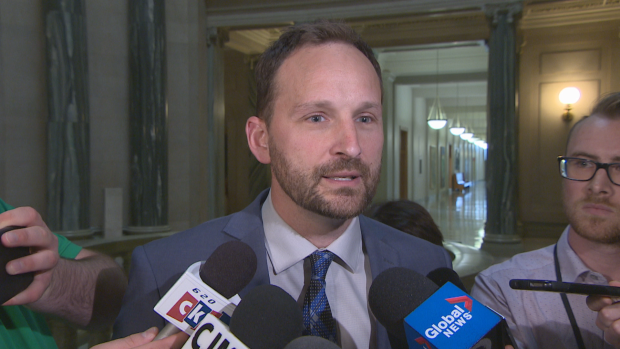NDP leader accuses government of voter suppression and gerrymandering at expense of Indigenous people
On Tuesday, Saskatchewan NDP leader Ryan Meili accused the Saskatchewan Party government of implementing policies that suppress the votes of Indigenous people while also gerrymandering.
Meili did not provide examples of either but pointed two two pieces of legislation.
Meili pointed to changes to The Elections Act in 2010, which required voters to to produce approved identification, such as government-issued photo ID.
He also cited The Representation Act, which changed the electoral boundaries in 2013, after a review and recommendation of a non-partisan committee.
"We saw changes from this government. Changes to photo ID, changes to electoral boundaries. They ended up increasing the size of ridings, which had an influence of less ability for First Nations' votes to count."
Meili said the photo ID changes "decreased the ability for First Nations people to vote", without offering evidence.
"There's already been decisions made that have made it more difficult. What I want to do make sure we're going in the opposite direction, that we are doing everything we can to increase turnout."
On gerrymandering, which means manipulating electoral boundaries for political gain, Meili said the review in 2012, which led to a redrawing of the electoral map, did not take into account people under 18. He said this led to a underestimation of First Nations communities.

"I do think there are concerns with this government and their interest in serving the needs of First Nations people and making sure their voices are heard in elections," Meili said.
The Saskatchewan Constituency Boundaries Commission underwent a review of boundaries in 2012. The province passed Bill 79, The Representation Act, into law in May 2013. The changes added three new constituencies, for a total of 61. The changes went into effect on election day, April 4, 2016.
The commission was headed by Queen's Bench Judge Neil Gabrielson, from Saskatoon; Stuart Pollon, a chartered accountant in Regina and Harry Van Mulligen, a retired MLA for the NDP.
Meili's accusations 'false and baseless': government
Meili's made the claim of voter suppression and gerrymandering in a media scrum following Question Period on Tuesday.
In a statement, the government called Meili's accusations of voter suppression "false and baseless".
According to Elections Saskatchewan, there were there 76 polls on First Nation reserve land in the 2011 general election. In 2016, there were 164 polls, an increase of 116 per cent.
A government spokesperson said, "the Chief Electoral Officer has already taken a number of steps to enable First Nations voters that may not have ID to be able to vote."
It said the Chief Electoral Officer is combating issues of voter ID concerns with a First Nations Enumeration Plan. It allows for a Letter of Authorization, signed by a Chief, to serve as one piece of ID needed to vote.
In the same statement, the government called the accusation of gerrymandering "unfounded" and "inaccurate".
It said the electoral boundaries are reviewed every 10 years by an all-party committee that includes the Chief Electoral Officer and representatives of both the Saskatchewan Party and the NDP.
On Tuesday, Minister of Justice Don Morgan said that in the last election, "two or three" of the more than 70 First Nations did not have polling stations but that was because they did not communicate with Elections Saskatchewan.
He encouraged all First Nations to reach out to Elections Saskatchewan to ensure they have at least one polling station for the October 2020 election.
"I want to see everybody in this province that is entitled to vote, able to cast a ballot," Morgan said.
Morgan was not able to respond directly to Meili's statements because he spoke with reporters before Meili did.

